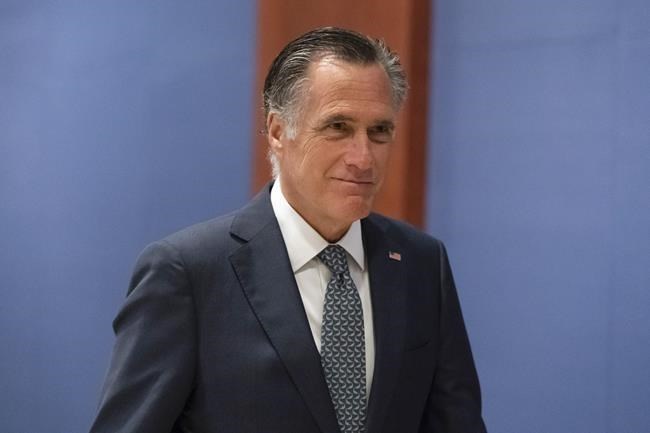WASHINGTON (AP) — Senate bargainers have reached agreement on a slimmed-down $10 billion package for countering COVID-19, the top Democratic and Republican negotiators said Monday, but the measure dropped all funding to help nations abroad combat the pandemic.
Senate Majority Leader Chuck Schumer, D-N.Y., said the deal would give the government “the tools we need" to continue battling the disease. Sen. Mitt Romney, R-Utah, trumpeted budget savings in the measure that he said meant it “will not cost the American people a single additional dollar."
At least half the measure would have to be used to research and produce therapeutics to treat the disease, according to fact sheets distributed by Schumer and Romney, the two top bargainers.
The money would also be used to buy vaccines and tests. At least $750 million would be used to research new COVID-19 variants and to expand vaccine production, the descriptions said.
The agreement comes with party leaders hoping to move the legislation through Congress this week, before lawmakers leave for a two-week spring recess. It also comes with BA.2, the new omicron variant, expected to spark a fresh increase in U.S. cases. Around 980,000 Americans and over 6 million people worldwide have died from COVID-19.
THIS IS A BREAKING NEWS UPDATE. AP’s earlier story follows below.
WASHINGTON (AP) — Bipartisan Senate bargainers have agreed to a slimmed-down $10 billion package for countering COVID-19, but without any funds to help nations abroad combat the pandemic, Democrats and Republicans familiar with the talks said Monday.
At least half the measure would have to be used to research and produce therapeutics to treat the disease, according to a fact sheet distributed by the chief GOP bargainer, Sen. Mitt Romney of Utah. And at least $750 million would be used to research new COVID-19 variants and to expand vaccine production, the description said.
The agreement comes with party leaders hoping to move the legislation through Congress this week, before lawmakers leave for a two-week spring recess. It also comes with BA.2, the new omicron variant, expected to spark a fresh increase in U.S. cases. Around 980,000 Americans and over 6 million people worldwide have died from COVID-19.
The accord represents a deep cut from the $22.5 billion President Joe Biden initially requested, and from a $15 billion version that both parties' leaders had negotiated last month. House Speaker Nancy Pelosi, D-Calif., abandoned that plan after Democratic lawmakers rejected proposed cuts in state pandemic aid to help pay for the package.
The $15 billion plan had included about $5 billion for the global effort to fight COVID-19, which has run rampant in many countries, especially poorer ones. The overall price tag has shrunk, and the global money has fallen off, as the two parties have been unable to agree on more than $10 billion in budget savings to pay for it.
Some people said the fate of the new agreement remained uncertain in the House, where Pelosi and liberal Democrats have expressed opposition to dropping the money for helping other countries.
Rep. Pramila Jayapal, leader of the House Progressive Caucus, said erasing the global assistance from the package “is a big problem,” and said she and other supporters of helping other countries have voiced their objections to House leadership and Senate negotiators. “It’s really shortsighted to not spend money on making sure this virus is contained around the world,” Jayapal, a Washington state Democrat who worked in global public health for a decade, told reporters.
The two Democrats and three Republicans who described the accord did so on condition of anonymity because they weren't authorized to discuss the talks publicly.
One of the Democrats, and a third member of that party, said it remained unclear whether the emerging package would attract the minimum 10 GOP votes needed for the measure to move through the 50-50 Senate. The others said the needed Republican votes would be there.
The measure is fully paid for by pulling back unspent funds from previous pandemic relief bills that have been enacted, bargainers have said.
Romney's fact sheet says those savings include $2.3 billion from a fund protecting aviation manufacturing jobs; $1.9 billion from money for helping entertainment venues shuttered by the pandemic; another $1.9 billion from a program that helps states extend credit to small businesses; and $1.6 billion from agriculture assistance programs.
___
AP writer Farnoush Amiri contributed to this report.
Alan Fram, The Associated Press


